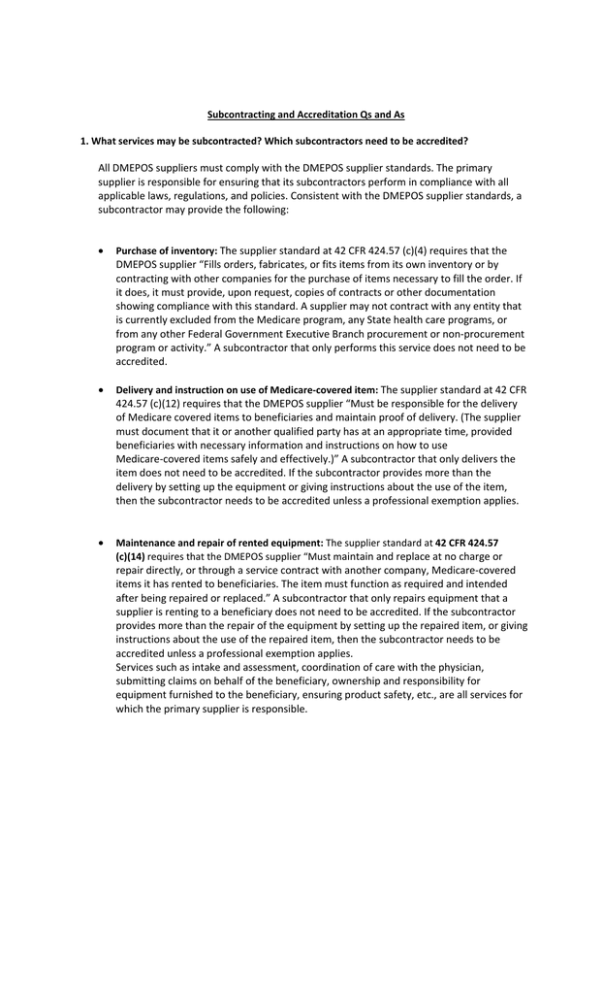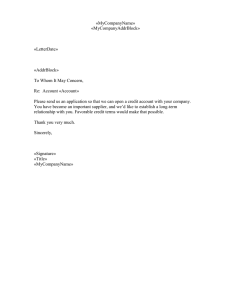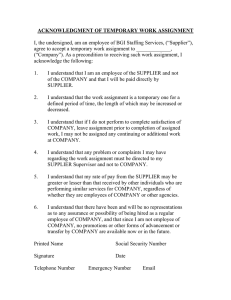Subcontracting and Accreditation Qs and As
advertisement

Subcontracting and Accreditation Qs and As 1. What services may be subcontracted? Which subcontractors need to be accredited? All DMEPOS suppliers must comply with the DMEPOS supplier standards. The primary supplier is responsible for ensuring that its subcontractors perform in compliance with all applicable laws, regulations, and policies. Consistent with the DMEPOS supplier standards, a subcontractor may provide the following: Purchase of inventory: The supplier standard at 42 CFR 424.57 (c)(4) requires that the DMEPOS supplier “Fills orders, fabricates, or fits items from its own inventory or by contracting with other companies for the purchase of items necessary to fill the order. If it does, it must provide, upon request, copies of contracts or other documentation showing compliance with this standard. A supplier may not contract with any entity that is currently excluded from the Medicare program, any State health care programs, or from any other Federal Government Executive Branch procurement or non‐procurement program or activity.” A subcontractor that only performs this service does not need to be accredited. Delivery and instruction on use of Medicare‐covered item: The supplier standard at 42 CFR 424.57 (c)(12) requires that the DMEPOS supplier “Must be responsible for the delivery of Medicare covered items to beneficiaries and maintain proof of delivery. (The supplier must document that it or another qualified party has at an appropriate time, provided beneficiaries with necessary information and instructions on how to use Medicare‐covered items safely and effectively.)” A subcontractor that only delivers the item does not need to be accredited. If the subcontractor provides more than the delivery by setting up the equipment or giving instructions about the use of the item, then the subcontractor needs to be accredited unless a professional exemption applies. Maintenance and repair of rented equipment: The supplier standard at 42 CFR 424.57 (c)(14) requires that the DMEPOS supplier “Must maintain and replace at no charge or repair directly, or through a service contract with another company, Medicare‐covered items it has rented to beneficiaries. The item must function as required and intended after being repaired or replaced.” A subcontractor that only repairs equipment that a supplier is renting to a beneficiary does not need to be accredited. If the subcontractor provides more than the repair of the equipment by setting up the repaired item, or giving instructions about the use of the repaired item, then the subcontractor needs to be accredited unless a professional exemption applies. Services such as intake and assessment, coordination of care with the physician, submitting claims on behalf of the beneficiary, ownership and responsibility for equipment furnished to the beneficiary, ensuring product safety, etc., are all services for which the primary supplier is responsible. 2. Under the supplier standards, may a supplier subcontract out for other services? A supplier may subcontract for the purchase of inventory, delivery and instruction on use of the Medicare‐covered item, or the maintenance and repair of rented equipment. Services such as intake and assessment, coordination of care with the physician, submitting claims on behalf of the beneficiary, ownership and responsibility for equipment furnished to the beneficiary, and ensuring product safety are all services for which the primary supplier is responsible. 3. May a supplier subcontract specifically for the delivery of the item? A supplier may subcontract specifically for the delivery of the item (e.g., by using a common carrier such as Federal Express, the United States Postal Service, or the United Parcel Service). If the subcontractor only delivers the item, the subcontractor need not be accredited. If the subcontractor is providing more than the delivery by setting up the equipment or giving instructions about the use of the item, then the subcontractor must be accredited. 4. Do manufacturers need to be accredited to perform warranty repairs? No. Manufacturers do not need to be accredited when they make such repairs. Repairs made under warranty are not a covered service or paid for by Medicare.



